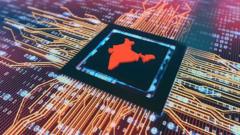As artificial intelligence continues to reshape various fields, DARPA's latest initiative seeks to leverage this technology to accelerate pure mathematical research, aiming to create a new frontier in computational capabilities.
Can Artificial Intelligence Revolutionize Mathematical Discoveries?

Can Artificial Intelligence Revolutionize Mathematical Discoveries?
Exploring DARPA's New Initiative to Enhance Mathematical Research through AI Collaboration
Artificial intelligence has made strides in various creative and practical fields, but its application in mathematics remains a challenging frontier. Large language models like OpenAI's ChatGPT have struggled with fundamental mathematical concepts, igniting discourse around their limitations in complex reasoning tasks. The Defense Advanced Research Projects Agency (DARPA) has introduced a new initiative, named Exponentiating Mathematics, aimed directly at addressing these challenges. This program invites researchers to partner with A.I. as a co-author in conducting high-level mathematical research, hoping to not only hasten progress in pure mathematics but also transform A.I. into a formidable mathematician.
Patrick Shafto, a mathematician and program manager within DARPA’s information innovation office, emphasized that mathematics serves as a critical testing ground for the current challenges faced by A.I. systems. The improvement of A.I. in this domain could potentially unleash a wave of enhanced capabilities that would benefit both mathematicians and society as a whole. “It’s a virtuous cycle of understanding,” he noted, indicating that advancements in mathematical research could simultaneously yield insights into A.I.'s development.
The historical context of DARPA showcases its dual legacy of innovation and controversy. Established post-World War II during America’s competition with the Soviet Union, DARPA has played a pivotal role in advancing technology that ultimately led to the creation of the internet, drones, and even intelligent personal assistants. However, it has also been linked to projects that had devastating consequences, such as the use of Agent Orange in the Vietnam War.
Insights from experts like Alondra Nelson, who served as a scientific adviser during the Biden administration, suggest that a mathematically proficient A.I. could innovate areas such as cryptography and facilitate explorations in space. As these researchers embark on this ambitious initiative to blend mathematics with A.I., the potential implications for both fields are immense, opening new avenues for collaboration and discovery.
While the road ahead might be complicated, the marriage between mathematics and artificial intelligence could lead to transformative advancements, highlighting the importance of cross-disciplinary efforts in tackling some of humanity's most pressing challenges.
Patrick Shafto, a mathematician and program manager within DARPA’s information innovation office, emphasized that mathematics serves as a critical testing ground for the current challenges faced by A.I. systems. The improvement of A.I. in this domain could potentially unleash a wave of enhanced capabilities that would benefit both mathematicians and society as a whole. “It’s a virtuous cycle of understanding,” he noted, indicating that advancements in mathematical research could simultaneously yield insights into A.I.'s development.
The historical context of DARPA showcases its dual legacy of innovation and controversy. Established post-World War II during America’s competition with the Soviet Union, DARPA has played a pivotal role in advancing technology that ultimately led to the creation of the internet, drones, and even intelligent personal assistants. However, it has also been linked to projects that had devastating consequences, such as the use of Agent Orange in the Vietnam War.
Insights from experts like Alondra Nelson, who served as a scientific adviser during the Biden administration, suggest that a mathematically proficient A.I. could innovate areas such as cryptography and facilitate explorations in space. As these researchers embark on this ambitious initiative to blend mathematics with A.I., the potential implications for both fields are immense, opening new avenues for collaboration and discovery.
While the road ahead might be complicated, the marriage between mathematics and artificial intelligence could lead to transformative advancements, highlighting the importance of cross-disciplinary efforts in tackling some of humanity's most pressing challenges.























